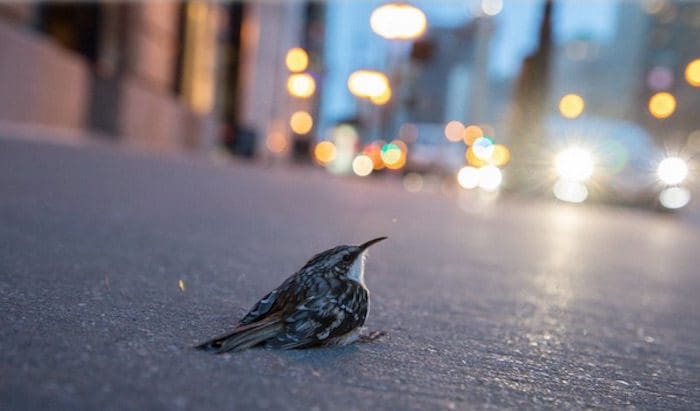Search Posts
Recent Posts
- Rhode Island Weather for May 28, 2025 – Jack Donnelly May 28, 2025
- It is what it is: 5.28.25 – Jen Brien May 28, 2025
- High Schoolers 14-19: Work out all summer free. Planet Fitness High School Summer Pass™ May 28, 2025
- Sour Grapes! – Meet Tim Jones at Draw-Off with National Cartoonist Society at An Unlikely Story May 28, 2025
- William Monahan appointed President of Swan Point Cemetery May 28, 2025
Categories
Subscribe!
Thanks for subscribing! Please check your email for further instructions.

The Dead Birds of Downtown… horrified to death by building’s ugliness?
By David Brussat, Architecture Here and There
The Wexford Innovation Center, completed last year in Providence’s I-195 corridor dedicated to technology, has been killing birds. No, they are not horrified to death by its ugliness; rather, they are disoriented by its reflective plate-glass windows, which birds think they can fly through. Big mistake. Maybe they are horrified by the ugliness and then by the impact.
The Boston Globe ran a story on this, “Outside of Providence’s newest building, birds keep dying,” by Dan McGowan, one of a Globe bureau here that also includes two former Providence Journal reporters. New York, San Francisco and Toronto have ordinances to make building glass less deadly to birds. Recent efforts in Chicago are described in the Chicago Tribune, whose story on glass buildings as ornithological assassins achingly quotes Chicago Bird Collision Monitors’ director Annette Prince:
“Migration is an astounding feat of nature,” Prince said. “It’s an amazing process that these birds go through. The fact they even survive is incredible. These little birds weigh only a few ounces and travel thousands of miles on their own energy. “So, it’s unfortunate that the birds we find here in the spring have made it all the way from South America, almost to their nesting grounds in Wisconsin, and they hit a window.”
Celebrated Tribune architecture critic Blair Kamin followed up its reporters Tony Briscoe and Cindy Dampier’s lengthy news story with a column, so maybe the issue has reached critical mass – not a moment too soon.
Chicago may be the most dangerous American city for birds. A great many of the buildings downtown on its skyline, and especially those along its Lake Michigan waterfront, are sheathed in glass. Chicago’s proposed ordinance protecting birds concentrates on dimming or shutting off buildings’ interior and exterior lights after dark. A small voluntary alliance of bird protectors and building managers has been in effect since 1995 and is believed to have saved the lives of 10,000 birds a year. But crashes are estimated to kill up to a billion birds a year nationally, second only to deaths from predators such as feral cats. (Wind turbines kill approximately 328,000 birds a year.)
My naturalist friend Frederick Gorham Thurber reminds me in a comment on “O starchitect house blues!” that city buildings are not the only culprits:
The modern monstrosities in the woods are murder on endangered birds such as wood thrush and various warblers. Because of all the glass. One thing I notice is that the McMansions going up in the woods here are rarely occupied. A few weeks a year maybe. And then they bring me dead birds that hit the glass to ID.
(Thurber has recently published In the Wake of the Willows, a sequel to or fanbook of classic Wind in the Willows.)
Buildings such as the Wexford Center in Providence, rising just seven stories, have tinted glass that makes them even more dangerous. Compared with low buildings up to three stories and high-rises above twelve, buildings between four and eleven stories kill more birds because they are by far more abundant in the nation’s cities than skyscrapers. Lights in glass buildings don’t always kill birds directly; many birds get disoriented, as do moths, by the lights, fly round and round, and die of exhaustion.
You’d think that buildings lit at night would be easier for birds to see than darkened buildings, but that’s not so. Of course, my own preference would be to ban modernist glass buildings altogether. Saving birds by reducing ugliness would, to use a possibly inapt phrase, kill two birds with one stone. But that will never happen. It makes too much sense.

David Brussat – www.ArchitectureHereandThere.com. This blog was begun in 2009 as a feature of the Providence Journal, where I was on the editorial board and wrote a weekly column of architecture criticism for three decades. Architecture Here and There fights the style wars for classical architecture and against modern architecture, no holds barred. History Press asked me to write and in August 2017 published my first book, “Lost Providence.” I am now writing my second book. My freelance writing on architecture and other topics addresses issues of design and culture locally and globally. I am a member of the board of the New England chapter of the Institute of Classical Architecture & Art, which bestowed an Arthur Ross Award on me in 2002. I work from Providence, R.I., where I live with my wife Victoria, my son Billy and our cat, Gato. If you would like to employ my writing and editing to improve your work, please email me at my consultancy, dbrussat@gmail.com, or call 401.351.0457. Testimonial: “Your work is so wonderful – you now enter my mind and write what I would have written.” – Nikos Salingaros, mathematician at the University of Texas, architectural theorist and author of many books.
